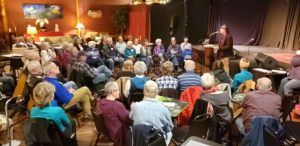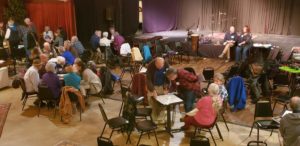 About six weeks ago, some neighbors of mine gathered at the White Horse Black Mountain for a two-hour conversation. Fifty-five people showed up to learn, and to offer their help. They did both. I’ve seldom been as inspired by my community as I was that night.
About six weeks ago, some neighbors of mine gathered at the White Horse Black Mountain for a two-hour conversation. Fifty-five people showed up to learn, and to offer their help. They did both. I’ve seldom been as inspired by my community as I was that night.
We were meeting to talk about asylum seekers, large numbers of whom are currently being held in overcrowded, for-profit detention centers in the United States. Asylum seekers should not be confused with people seeking sanctuary (protection by religious groups from legally mandated deportation). Asylum seekers usually do not cross the border illegally, but rather, present themselves at the border to ask for asylum, because their lives are in danger in their home countries.
Asylum is a protection granted to foreign nationals already in the United States or at the border who meet the international law definition of a “refugee.” The United Nations 1951 Convention and 1967 Protocol define a refugee as a person who is unable or unwilling to return to his or her home country, and cannot obtain protection in that country, due to past persecution or a well-founded fear of being persecuted in the future “on account of race, religion, nationality, membership in a particular social group, or political opinion.” Congress incorporated this definition into U.S. immigration law in the Refugee Act of 1980.
As a signatory to the 1967 Protocol, and through U.S. immigration law, the United States has legal obligations to provide protection to those who qualify as refugees. The Refugee Act established two paths to obtain refugee status—either from abroad as a resettled refugee or in the United States as an asylum seeker.
People who are being held in asylum, often fleeing gang violence or government persecution in their own countries, are extensively interviewed when they arrive, to prove that they have a ‘credible fear’ of being tortured or killed at home. The burden of proof is on the asylum seeker, and that they are not, themselves, a danger to the United States and its people. Many are immediately sent back.
Adjudicating an asylum claim can take years, and many people remain jailed for that entire time, in spite of having committed no crime other than asking for help. If asylum seekers, or compas (short for compañeros or compañeras), have support from people who will sign for them, however, they may be released while navigating their cases.
 And that’s what we gathered to talk about — whether we have the resources to support a compa here in Black Mountain while they wait for their case to move through the court system. By law, an asylum seeker is not allowed to work for 150 days, so they need lodging, food, translation help, transportation (including to court appearances), and many other forms of support. In an effort to materially address this situation, I asked folks to come to this meeting, led by my friends Holly, Susan, Bobby, and me. Fifty-five showed up, and they organized themselves into committees to address the various needs. At the end of the meeting, we had commitments for lodging, a translation team with five languages available, financial support and a fundraising team, seven people on a transportation team, a legal committee to seek out legal support and help navigating that process, a food and hospitality committee, etc. It was, and is, extraordinary. I am so proud of the people who showed up, and then showed up, representing several faith communities in Black Mountain, and folks who claim no particular faith.
And that’s what we gathered to talk about — whether we have the resources to support a compa here in Black Mountain while they wait for their case to move through the court system. By law, an asylum seeker is not allowed to work for 150 days, so they need lodging, food, translation help, transportation (including to court appearances), and many other forms of support. In an effort to materially address this situation, I asked folks to come to this meeting, led by my friends Holly, Susan, Bobby, and me. Fifty-five showed up, and they organized themselves into committees to address the various needs. At the end of the meeting, we had commitments for lodging, a translation team with five languages available, financial support and a fundraising team, seven people on a transportation team, a legal committee to seek out legal support and help navigating that process, a food and hospitality committee, etc. It was, and is, extraordinary. I am so proud of the people who showed up, and then showed up, representing several faith communities in Black Mountain, and folks who claim no particular faith.
 Now we are in communication with the Asylum Seeker Sponsorship Project, which is carefully vetting us as we move closer to welcoming a compa to Black Mountain. In my faith tradition, we are in the season of Advent, awaiting the birth of a child who would soon be a persecuted refugee, and then go on to be one who suggested a completely different way to be in the world from the standard narrative, then and now. He suggested that we could be radically supportive of each other, to acknowledge that all people are equally treasured and valued by their Creator. Each time people tried to draw lines between ‘us’ and ‘them’, he stepped across those lines. I find it impossible to divorce that story from the present reality of other refugees, now seeking a chance to live and grow.
Now we are in communication with the Asylum Seeker Sponsorship Project, which is carefully vetting us as we move closer to welcoming a compa to Black Mountain. In my faith tradition, we are in the season of Advent, awaiting the birth of a child who would soon be a persecuted refugee, and then go on to be one who suggested a completely different way to be in the world from the standard narrative, then and now. He suggested that we could be radically supportive of each other, to acknowledge that all people are equally treasured and valued by their Creator. Each time people tried to draw lines between ‘us’ and ‘them’, he stepped across those lines. I find it impossible to divorce that story from the present reality of other refugees, now seeking a chance to live and grow.
This is hard work, and sometimes includes a great deal of frustration and disappointment. No one in that room (including me) is getting paid for their time and effort. People are willing to do it simply because it is the right thing to do. In times when the headlines are full of horrific news, please remember that this kind of work is happening all over, usually beneath the radar of the media. People are gathering to help each other, to work as community, and to lean toward the Light. All of us left feeling deeply encouraged and a little more hopeful, and I believe that hope is the fuel for meaningful change.
If you are local, and would like to be a part of this work, drop a note and I’ll happily add you to the mailing list. If you are farther away, and would like to explore doing this work in your own community, I recommend that you get in touch with the Asylum Seeker Sponsorship Project.
Blessings on your own efforts to lean toward the light in these, the darkest days of the year on this half of the planet. It won’t be long until the light will return.
Grace and peace,

Leave a Reply